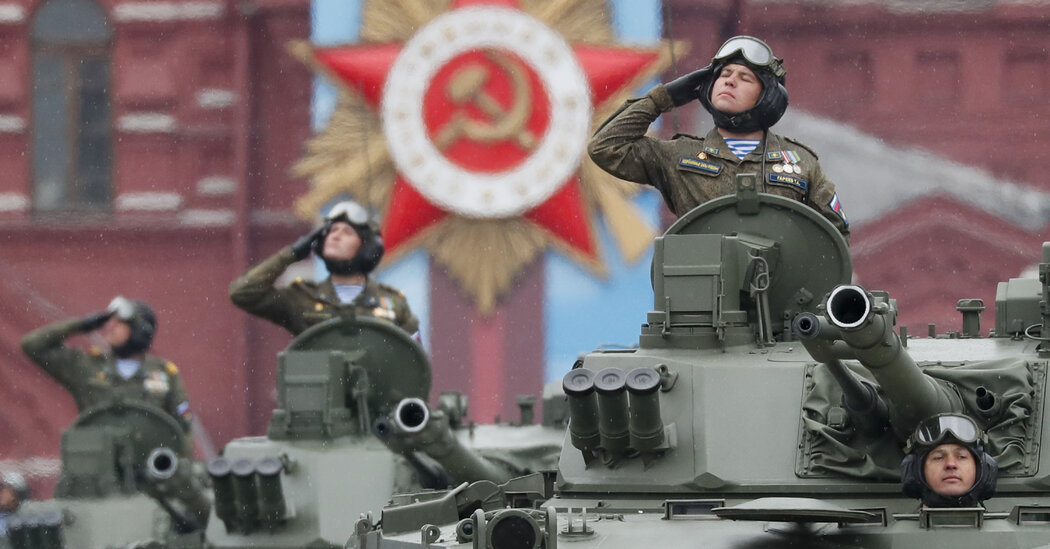
Marked by grandiose speeches, a colossal parade and a show of military might on Red Square, Russia’s Victory Day on May 9, a holiday celebrating the Soviet Union’s vanquishing of Nazi Germany, has taken on particular resonance this year with Russia mired in a war in Ukraine.
The holiday will take place as Russian state television broadcasts bellicose messages about supposed Nazis in Ukraine, and as the Kremlin leads a stumbling, grinding offensive that has cost thousands of Russians and Ukrainians their lives.
Because Russia’s invasion has failed to produce much in the way of victories, some analysts fear that President Vladimir V. Putin will use the occasion to turn what he has called a “special military operation” into an all-out war, and to mobilize Russians for a more broad-ranging conflict. The Kremlin, for its part, denied on Wednesday that it would declare war.
Here’s a look at the significance the holiday has taken during Mr. Putin’s two decades in power.
Why does Victory Day matter so much this year?
In years past, Mr. Putin has used May 9 — a near-sacred holiday for Russians to remember the 27 million Soviets who died in World War II — to mobilize the nation for the possibility of a new battle ahead. When he addressed the nation from his rostrum at Red Square on May 9 last year, he warned that Russia’s enemies were deploying once again “much of the ideology of the Nazis.”
Now, Russian state media is referring to Ukrainians who have resisted the Russian invasion as “Nazis,” and portraying the fight as the unfinished business of World War II. It seems almost certain that Mr. Putin will use his May 9 speech next week to invoke the heroism of Soviet soldiers in World War II to try to inspire Russians to make new sacrifices. The narratives Mr. Putin has been spinning to justify his war in Ukraine are very much in line with the grand, nostalgic narratives of Victory Day.
Analysts who follow Russia closely, however, say it is far from certain that Mr. Putin will declare an official state of war and announce mass mobilization, which could entail a military draft and a prohibition on Russian men of military age being allowed to leave the country.
Although a shared respect for the sacrifices of World War II remains a unifying force in Russia, a new draft or travel restrictions could provoke a blowback. Russian forces have suffered heavy losses in Ukraine — Western officials estimate that more than 7,000 Russian soldiers have been killed — and some families of service members have questioned the official silence about the scope of casualties.
What happens on Victory Day?
Victory Day military parades in major Russian cities are followed by marches of ordinary citizens carrying pictures of relatives who fought in the war. Hundreds of thousands, if not millions, take part in “Immortal Regiment” marches honoring the soldiers and civilians who fought and died in the war. On Red Square, the event also features a display of historical military weapons, modern tanks and missile systems and other expressions of Russian military grandeur.
Over more than two decades, Mr. Putin has helped transform Victory Day into the most important holidays of the year, a joyous, nostalgic ritual that buttresses national pride and unifies a sometimes divided society.
Two years ago, the event was overshadowed by the coronavirus pandemic. A grand party scheduled in Moscow was canceled. Billboards promoted patriotic concerts, plays and songfests that were ultimately called off. A flyby over the city by warplanes and military helicopters took place, but Moscow’s mayor told residents not to go out to watch it.
Still, state television scrolled the names of the Russian dead while orange trucks sent to spray the streets with disinfectant and water were emblazoned with stickers declaring “Victory.” Copies of the red banner that was raised above the Reichstag in Berlin in 1945 also flew on Moscow’s streets.
Russia-Ukraine War: Key Developments
Fears of an expanded war rise. With the Russian military still struggling, Western officials are looking with increased alarm to Russia’s Victory Day holiday on May 9. Anxiety is growing that President Vladimir V. Putin will exploit the celebration of the Soviet triumph over the Nazis to intensify attacks and formally declare war.
In recent years, the parade on Victory Day — once attended by dignitaries from China, Germany and the United States, among others — has also reflected Russia’s growing isolation, with many foreign leaders staying away. Mr. Putin’s spokesman said last week that no foreign leaders had been invited to this year’s event, the 77th anniversary of the victory.
And the event itself became a point of tension between Ukraine and Russia in 2015, when Ukraine’s president designated May 8 the national holiday, in line with much of Europe.
How and why has Mr. Putin tied Russia’s victory over the Nazis to his Ukraine offensive?
Mr. Putin has variously called Ukraine’s government “openly neo-Nazi,” “pro-Nazi” and controlled by “little Nazis.” Announcing Russia’s “special military operation” in Ukraine, he said its goals included the “demilitarization and denazification” of the country.
The language of Russia’s invasion of Ukraine has been dominated by the word “Nazi” — a bizarre contention about a country whose president, Volodymyr Zelensky, is Jewish, and last fall signed a law combating antisemitism. Mr. Putin has applied the word regularly to the country’s present-day government in recent months, though he has long referred to Ukraine’s pro-Western revolution of 2014 as a fascist coup.
The “Nazi” slur’s sudden emergence shows how Mr. Putin is trying to use stereotypes, distorted reality and his country’s lingering World War II trauma to justify his invasion of Ukraine. The Kremlin is casting the war as a continuation of Russia’s fight against evil in what is known in the country as the Great Patriotic War. He appears to be counting on lingering Russian pride in the victory over Nazi Germany to carry over into support for the war in Ukraine.




